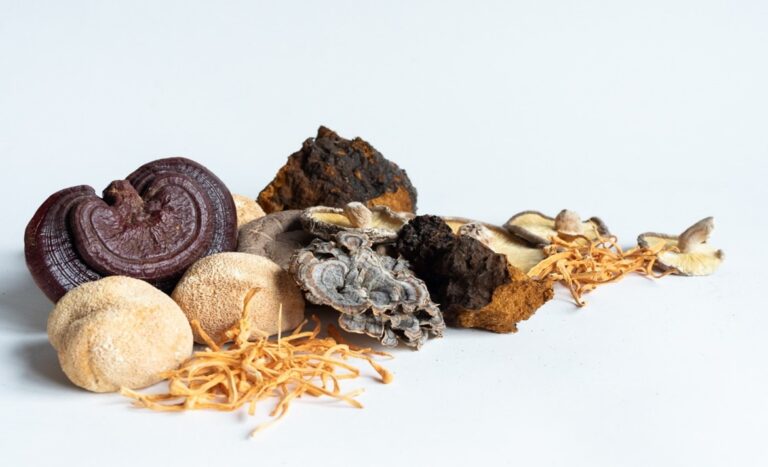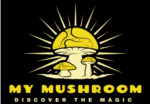Functional Mushrooms (non psilocybin)
Mushrooms are a powerful, and often underutilized, tool for health and longevity.

They provide important nutrients, including those used in methylation cycles- folate, choline, and zinc for example. Their bioactive compounds also act as DNA methylation adaptogens, with the ability to influence gene expression and even potentially biological age. It’s why mushrooms feature as one of the Younger You Dynamic Dozen foods.
Mushroom benefits are supported by traditional knowledge, modern scientific studies and clinical success. In fact, multiple drugs and medical innovations are derived from fungi or endophytic fungi. Some of these include: Lovastatin, Cyclosporin A, Taxol and Ergotamine and multiple antibiotics (Penicillin, Amoxicillin, Cephalosporin).
All mushrooms contain primary and secondary medicinal active compounds. The most studied primary active compounds are key polysaccharides called beta-d-glucans (beta-glucans). These beta-glucans activate key receptors on immune cells activating the innate and adaptive immune system (the two main branches of our immune response). These compounds may also impact the memory of innate immune cells, creating metabolic changes priming future immune activity also known as trained innate immunity.
The secondary medicinal compounds are specific to each mushroom since all mushrooms have baseline immune modulation activity plus their own unique medicinal qualities. For example, Lion’s Mane mushrooms contain beta-glucans helpful for the immune system but also isoindolinones and hericenones which have an affinity to the nervous system Lion’s Mane also is used traditionally for digestive and energy concerns.
Mushroom Benefits
1. Decrease the risk of cancer
A review of 17 cancer studies from 1966 to 2020 shows that eating just 18 grams of mushrooms (equal to about a 1/8-cup or two medium mushrooms) a day may lower your risk of cancer by as much as 45%. Mushrooms are a powerful source of ergothioneine, an amino acid and antioxidant that prevents or slows cellular damage.
Some mushroom varieties (such as shiitake, oyster, maitake and king oyster) have higher amounts of ergothioneine. But researchers found that incorporating any variety of mushrooms into your daily diet will lower your risk of cancer.
2. Lower sodium intake
Sodium and high blood pressure often go hand in hand. Sodium causes the body to retain excess fluid, which can increase blood pressure. To decrease your sodium intake, consider adding mushrooms to your meals.
Mushrooms are naturally low in sodium – an entire cup of white button mushrooms has just five milligrams of sodium. They offer savory flavor that reduces the need for added salt to keep your blood pressure low. A study from the Culinary Institute of American and UC Davis shows that swapping half of the meat for mushrooms in a traditional ground beef recipe can maintain flavor while reducing sodium intake by 25%.
3. Promote lower cholesterol
Mushrooms make an excellent substitute for red meat while minimizing calories, fat and cholesterol. Research shows that shiitake mushrooms, in particular, help to keep cholesterol levels low. They contain compounds that inhibit the production of cholesterol, block cholesterol from being absorbed and lower the overall amount of cholesterol in your blood.
4. Protect brain health
Researchers continue to study the effects of eating mushrooms on mild cognitive impairment (MCI). MCI causes memory and language difficulties and is often a precursor to Alzheimer’s disease.
In a study in Singapore, participants who ate more than two cups of mushrooms a week had a 50% lower risk of developing MCI. Even those who ate only one cup saw some benefit. The mushrooms eaten by participants included golden, oyster, shiitake and white button mushrooms.
5. Provide a source of vitamin D
Vitamin D helps your body absorb calcium to maintain and build strong bones. Many people rely on supplements or sunshine to get vitamin D, but if you’re looking to get this nutrient through your diet, mushrooms may be the answer. They are the only type of produce that is a source of vitamin D.
Like humans, certain mushrooms exposed to UV light or sunlight can increase their vitamin D amounts. White button, portabella and cremini mushrooms provide the most vitamin D after exposure to UV light or sunlight. To get the recommended daily amount, slice three mushrooms (or one portabella), expose them to sunlight for at least 15 minutes and enjoy. Eating a little more than one cup of maitake mushrooms achieves the same goal without the need for sun exposure.
6. Stimulate a healthier gut
The microbiome in your gut is home to organisms and bacteria that play a large role in your health and mood. One way to keep your gut healthy is to stimulate the growth of healthy bacteria in that space with the use of prebiotics, such as mushrooms.
Research shows that mushroom polysaccharides, their most abundant carbohydrate, stimulate the growth of healthy bacteria. While many foods break down with stomach acid, the polysaccharides found in mushrooms pass through the stomach unchanged and can reach the colon to encourage bacteria growth there.
7. Support a healthy immune system
Mushrooms contain macronutrients that support a healthy immune system. According to the Mushroom Council, your immune system will benefit from mushrooms whose nutrients include:
- Selenium,which helps your body make antioxidant enzymes to prevent cell damage. Choose cremini or portabella mushrooms for the most benefit.
- Vitamin D,which assists with cell growth, boosts immune function and reduces inflammation. Maitake mushrooms offer an easy way to add vitamin D to your diet.
- Vitamin B6,which helps your body form red blood cells, proteins and DNA. Shiitake mushrooms are the best choice for vitamin B6.
Here is a summary of the most commonly-used functional mushrooms.
- Reishi mushrooms are used traditionally for kidney support, lung support, increasing longevity, supporting cognition and qi (energy). Reishi mushrooms contain beta-glucans plus triterpenes which are highly functional.
- Turkey Tail mushrooms are used traditionally for cough, asthma, lung support, infections, tissue healing and digestion. Turkey tail mushrooms contain beta-glucans plus protein bound beta-glucans.
- Lion’s Manemushrooms are used traditionally for digestive, stress and brain support. Lion’s Mane is also used for dizziness, insomnia, and fatigue. Lion’s Mane mushrooms contain beta-glucans plus hericenones, isoindolinones and Hericene compounds.
- Cordycepsmushrooms are used traditionally for aphrodisiac, energy and fertility properties. Cordyceps also supports lung health, kidney tonification and is used to treat chronic illness. Cordyceps mushrooms contain beta glucans and cordycepin, a nucleoside (higher in the subspecies Cordyceps militaris)
- Maitakemushrooms are a traditional food in many cultures that support general health, digestion, diuresis and metabolism. Maitake mushrooms contain beta-glucans and key proteins.
- Shiitakemushrooms are used traditionally as a tonic food to improve energy, digestion circulation, pain control, metabolism and immune support. Shiitake mushrooms have beta-glucans plus eritadenine, a unique compound that accelerates cholesterol metabolism. Undercooked shiitake can cause topical dermatitis in sensitive and susceptible individuals.
- Tremellamushrooms are used traditionally as a food to support yin, skin health, lung health, reduce dryness and promote beauty. Tremella mushrooms have unique heteroglycan polysaccharides and mannans with a triple helix structure that allow for moisture retention.
- Oystermushrooms are used traditionally as a tonic food. Oyster mushrooms have beta-glucans, notably pleuran which most of the respiratory research evidence is based on. Oyster mushrooms contain lovastatin (a natural statin) and more ergothioneine (an amino acid that has potent redox regulatingactivities) than most cultivated mushrooms. Ergothioneine is protective against oxidative stress in pre-clinical trials in diseases of aging and levels of this amino acid decline with age.
- Poriais one of the most common fungi (sclerotium) used traditionally in Chinese Medicine herbal formulas for mood, indigestion and low energy. It also supports immune health and supports fluid metabolism. Paired with reishi, this sclerotium can support longevity. Poria contains beta-glucans plus unique triterpenes.
- Chaga, a canker (not a mushroom) is used traditionally for dermatologic and stomach concerns like psoriasis, gastrointestinal cancers, ulcers and gastritis. In other cultural medicine systems Chaga is used for metabolic support, pain relief and as a general health tonic. Chaga contains beta-glucans plus melanin complexes, lanostanic triterpenoids such as betulinic acid and inotodiol.
- White buttonmushrooms (WBM) are one of the most common culinary mushrooms. Traditionally WBMs are used for supporting general health and longevity. WBMs contain beta-glucans, proteoglucans and ergosterol. Ergosterol is found in most mushrooms but is higher in WBMs. Ergosterol is a Vitamin D2 precursor which is converted to Vitamin D2 upon exposure to UV light under specific conditions.
